世界领导人和国际风云人物都在辩论“构建人类命运共同体”这个话题,这是2017年习近平主席在瑞士达沃斯论坛发表的主旨演讲的主题,一年过去,此言论依然引起了全世界的共鸣。
World leaders and international figures are debating "creating a shared future in a fractured world," the theme of this year's World Economic Forum in Davos, Switzerland, as Chinese President Xi Jinping's signature speech at the 2017 meeting still resonates around the globe.
"As long as we keep to the goal of building a community of shared future for mankind and work hand in hand to fulfill our responsibilities and overcome difficulties, we will be able to create a better world and deliver better lives for our peoples," Xi said in his speech that offered inspiration to the world.
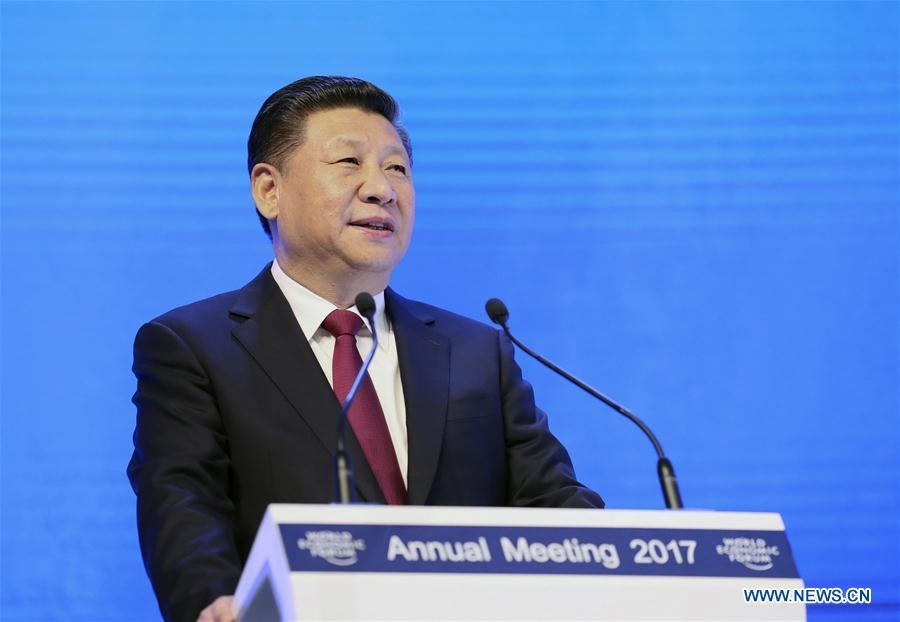
Chinese President Xi Jinping delivering a keynote speech at the opening plenary of the 2017 annual meeting of the World Economic Forum in Davos, Switzerland, Jan. 17, 2017. /Xinhua Photo
What does the concept mean?
Fu Ying, chairperson of the Foreign Affairs Committee of the National People's Congress, China's legislature, explained that the vision of "building a community with a shared future for mankind," was the culmination of President Xi's ideas on reforming and improving the existing international order.
"It also represents an effort to search for an answer to such big questions as to where mankind is heading against the backdrop of a changing global landscape and the need to improve global governance," Fu elaborated in an article.
The vision of creating a “community of shared future for mankind” encourages global and regional cooperation to help both developing countries and countries with higher levels of development to provide public goods and to narrow the North-South gap and regional imbalances, Fu explained.
Chinese Foreign Minister Wang Yi also expounded the vision, saying "the construction of a new type of international relations and the building of a "community with a shared future for mankind" make it necessary for China to make practical efforts and set an example, as well as unswervingly pursue a road to a great nation which is different from that of traditional powers."
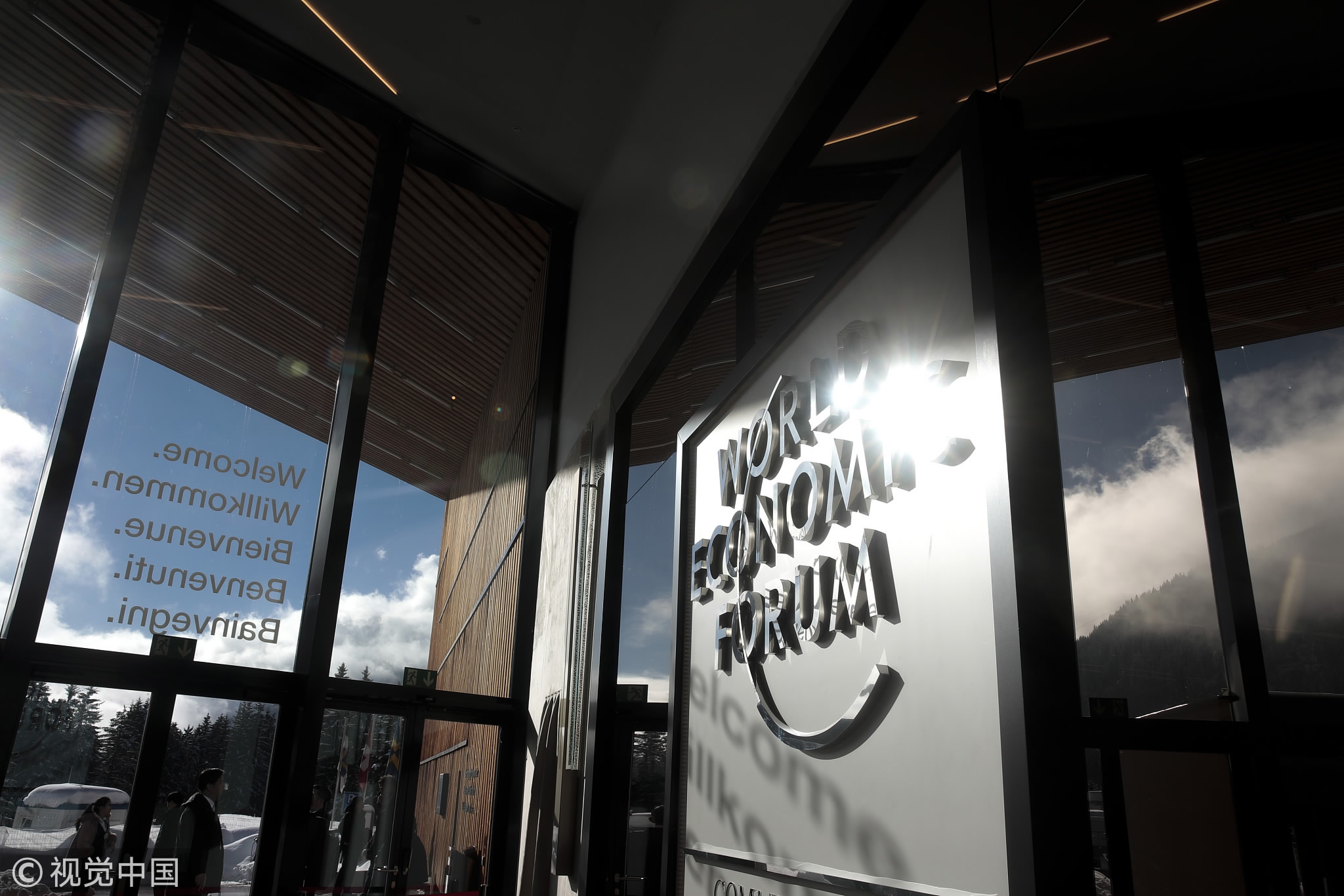
A World Economic Forum (WEF) sign stands at the entrance to the Congress Center on the opening day of the World Economic Forum (WEF) in Davos, Switzerland, on Jan. 23. /VCG Photo
"This is not only the historical duty that China, as a big socialist country, should undertake for the development of human society, but also the historical mission that the Chinese communists should advance for the progress of human political civilization," the minister added.
Sharing a shared vision
President Xi has mentioned the concept on many occasions at home and abroad, showing China's wisdom in global governance, but also its determination to work for an equal, open and peaceful world.
Xi first proposed the idea of a "community with a shared future for mankind" at the Moscow State Institute of International Relations in 2013, and the notion has since been elaborated on and implemented.
In January 2017, Xi expounded on the all-win cooperation concept at the WEF in Davos and in a keynote speech at the UN Office at Geneva, calling on all parties to uphold economic globalization.
The Belt and Road Forum for International Cooperation held in May in Beijing and the BRICS Leaders Meeting in September in Xiamen demonstrated China's resolution to build a "community of shared future for mankind" by promoting international cooperation. Xi also presented his proposal to promote interconnected growth to build a global community at the 2017 G20 summit in Hamburg.
In a three-and-a-half-hour work report delivered last October at the opening session of the 19th National Congress of the Communist Party of China (CPC), Xi, who is also general secretary of the CPC Central Committee, stressed Beijing's aspiration to build a "community with a shared future for mankind" six times.
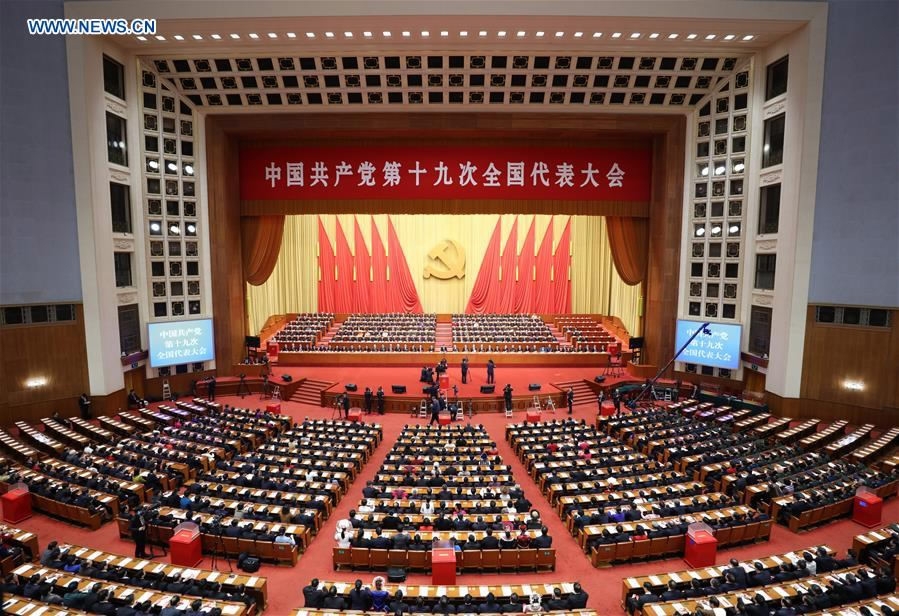
The closing session of the 19th National Congress of the Communist Party of China (CPC) at the Great Hall of the People in Beijing on Oct. 24, 2017. /Xinhua Photo
The Asia Pacific Economic Cooperation (APEC) meeting in Vietnam last November was themed “Creating New Dynamism, Fostering a Shared Future,” echoing Xi's concept. The Chinese president told the meeting that building a "community with a shared future for mankind" is "what we should do in conducting global economic governance in a new era."
Xi reiterated the vision at the CPC in Dialogue with World Political Parties High-Level Meeting in Beijing in December, saying it has been transformed from a concept into action.
"I'm delighted to see that the friendly cooperation between China and other countries is increasingly expanding and the concept of a community with a shared future for mankind is gaining support and endorsement from an increasing number of people," he said.
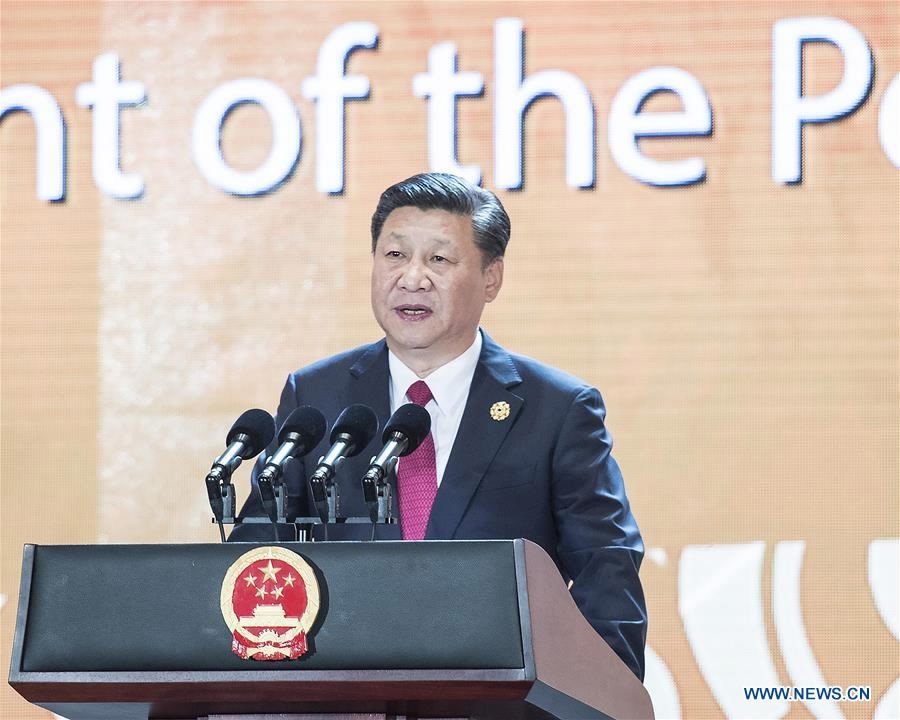
Chinese President Xi Jinping delivering a keynote speech at the Asia-Pacific Economic Cooperation (APEC) CEO Summit in Da Nang, Vietnam, Nov. 10, 2017. /Xinhua Photo
During talks with French President Emmanuel Macron in January in Beijing, Xi pointed out that China proposed building a "community with a shared future for mankind" as a solution to address the uncertainty in the world and noted that France holds a similar concept.
China's wisdom
Building "a community of shared future for mankind" has been written into UN resolutions and supported by the international community.
The concept was first adopted into an official UN document on Feb. 10, 2017 at the 55th session of the UN Commission for Social Development (UNCSD) and on Nov.1, 2017, the Committee of Disarmament and International Security of the 72nd Session of UN General Assembly approved two draft resolutions that both incorporated the concept.
The UN Secretary-General Antonio Guterres said he regards China as "a strong pillar of multilateralism" and he recognizes the aim of multilateralism is to build a "shared future".
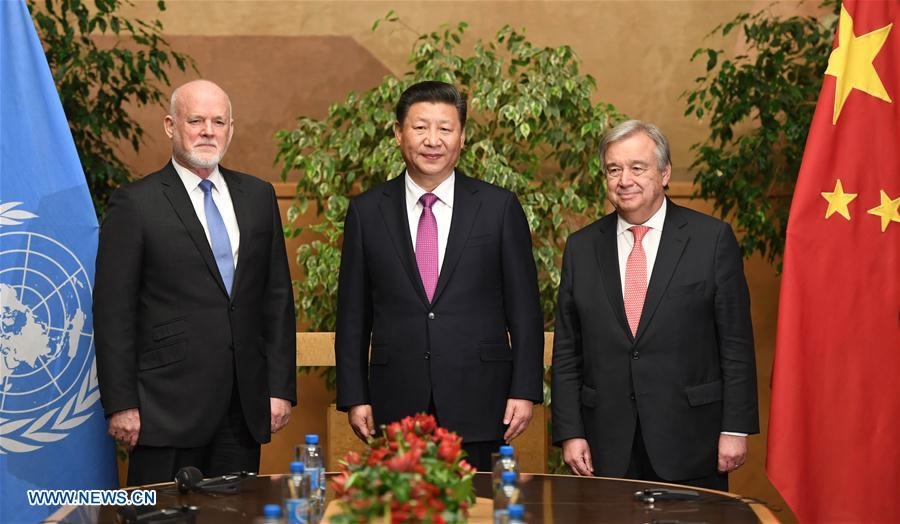
Chinese President Xi Jinping (C) meets with Peter Thomson (L), president of the 71st session of United Nations General Assembly, and UN Secretary-General Antonio Guterres in Geneva, Jan. 18, 2017. /Xinhua Photo
"Building a community of common destiny for mankind to me is the only future for humanity on this planet," UN General Assembly President Peter Thomson once said during an interview with Xinhua.
Izumi Nakamitsu, UN under-secretary-general and high representative for disarmament affairs, also said the idea of 'building a shared future' reflects China's commitment to multilateral diplomacy.
From the perspective of Maleeha Lodhi, Pakistan's ambassador to UN, the idea of creating a community of shared future is "critical" for world peace, global security and stability.
Meanwhile, the 25th annual APEC meeting in Da Nang spoke about fostering new dynamism and creating a shared future that also echoes the idea of "building a community with a shared future for humankind", embodying worldwide recognition to the concept.
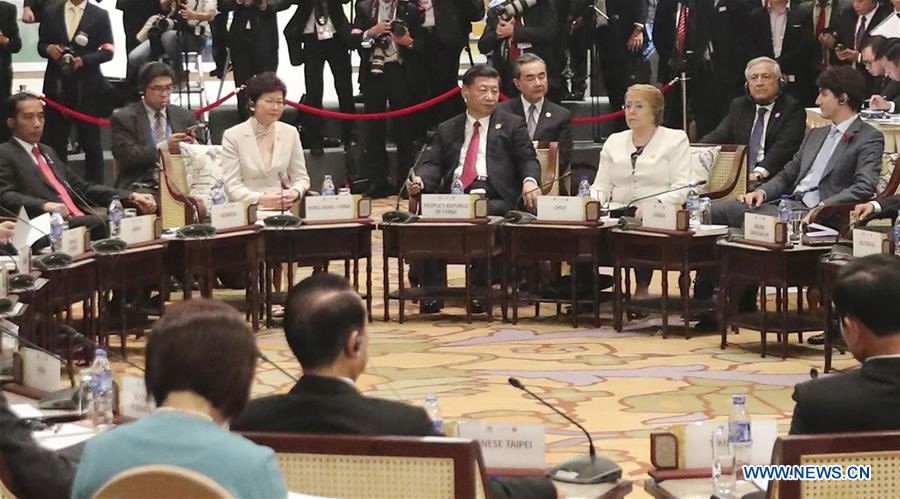
Chinese President Xi Jinping attends an informal dialogue between leaders from the Asia-Pacific Economic Cooperation (APEC) and the Association of Southeast Asian Nations (ASEAN) in Da Nang, Vietnam, Nov. 10, 2017. /Xinhua Photo
Zarko Obradovic, the vice president of the Socialist Party of Serbia, also spoke highly of the idea.
He said, "It is the first global initiative that absolutely fits into the concept of a community with a shared future for mankind, as well as the first concept that has a developmental component relating to such a great number of countries."
The concept provides Chinese wisdom for major issues concerning the future and destiny of humanity, commented Julio Rios, director of the Observatory of Chinese Politics (OPCh), which is affiliated to the Spanish think tank, the Galician Institute of Analysis and International documentation.
Singapore’s ambassador to China Stanley Loh Ka Leung also said building "a community of shared future for mankind" is a very appealing concept and is congruent with ASEAN's vision of a "sharing and caring" community.







